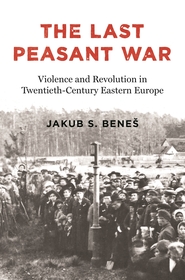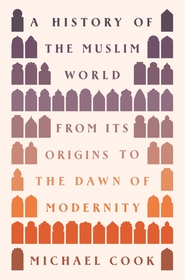
The Last Peasant War
Violence and Revolution in Twentieth-Century Eastern Europe
-
10% KEDVEZMÉNY?
- A kedvezmény csak az 'Értesítés a kedvenc témákról' hírlevelünk címzettjeinek rendeléseire érvényes.
- Kiadói listaár GBP 35.00
-
16 721 Ft (15 925 Ft + 5% áfa)
Az ár azért becsült, mert a rendelés pillanatában nem lehet pontosan tudni, hogy a beérkezéskor milyen lesz a forint árfolyama az adott termék eredeti devizájához képest. Ha a forint romlana, kissé többet, ha javulna, kissé kevesebbet kell majd fizetnie.
- Kedvezmény(ek) 10% (cc. 1 672 Ft off)
- Kedvezményes ár 15 049 Ft (14 333 Ft + 5% áfa)
Iratkozzon fel most és részesüljön kedvezőbb árainkból!
Feliratkozom
16 721 Ft

Beszerezhetőség
Becsült beszerzési idő: A Prosperónál jelenleg nincsen raktáron, de a kiadónál igen. Beszerzés kb. 3-5 hét..
A Prosperónál jelenleg nincsen raktáron.
Why don't you give exact delivery time?
A beszerzés időigényét az eddigi tapasztalatokra alapozva adjuk meg. Azért becsült, mert a terméket külföldről hozzuk be, így a kiadó kiszolgálásának pillanatnyi gyorsaságától is függ. A megadottnál gyorsabb és lassabb szállítás is elképzelhető, de mindent megteszünk, hogy Ön a lehető leghamarabb jusson hozzá a termékhez.
A termék adatai:
- Kiadó Princeton University Press
- Megjelenés dátuma 2025. március 25.
- Kötetek száma Print PDF
- ISBN 9780691212531
- Kötéstípus Keménykötés
- Terjedelem400 oldal
- Méret 234x155 mm
- Nyelv angol
- Illusztrációk 22 b/w illus. 4 maps. 758
Kategóriák
Hosszú leírás:
A history of the largely forgotten peasant revolution that swept central and eastern Europe after World War I—and how it changed the course of interwar politics and World War II
As the First World War ended, villages across central and eastern Europe rose in revolt. Led in many places by a shadowy movement of army deserters, peasants attacked those whom they blamed for wartime abuses and long years of exploitation—large estate owners, officials, and merchants, who were often Jewish. At the same time, peasants tried to realize their rural visions of a reborn society, establishing local self-government or attempting to influence the new states that were being built atop the wreckage of the Austro-Hungarian and Russian Empires. In The Last Peasant War, Jakub Beneš presents the first comprehensive history of this dramatic and largely forgotten revolution and traces its impact on interwar politics and the course of the Second World War.
Sweeping large portions of the countryside between the Alps and the Urals from 1917 to 1921, this peasant revolution had momentous aftereffects, especially among Slavic peoples in the former lands of the Austro-Hungarian Empire. It enabled an unprecedented expansion of agrarian politics in the interwar period and provided a script for rural resistance that was later revived to resist Nazi occupation and to challenge Communist rule in east central Europe.
By shifting historical focus from well-studied cities to the often-neglected countryside, The Last Peasant War reveals how the movements and ambitions of peasant villagers profoundly shaped Europe’s most calamitous decades.
"Important, knowledgeable and highly recommended."---David Marx, David Marx Book Reviews Több





